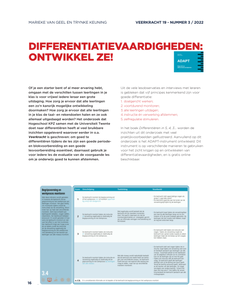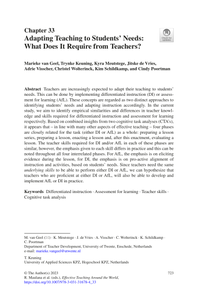A cornerstone of inclusive education is teacher’s readiness to respond adequately to different educational needs of students in their diverse classroom. Differentiated instruction, referring to the process by which teachers carefully monitor students’ needs and progress, and adapt their instruction according to these differences, is a means to meet the needs of students of different levels. High-quality differentiated instruction is a complex process for teachers which needs careful preparation. This makes teachers’ intentions relating to differentiated instruction particularly relevant. In this article we compare two theoretical models to explain teachers’ intentions to differentiate: the Theory of Planned Behavior (TPB) and Self-determination theory (SDT). Secondary school teachers (n = 180) responded to a questionnaire in which we measured their intentions and predictor variables relating to both of the theoretical models. Linear regression showed that both the TPB as well as the SDT model significantly predicted teachers’ intentions (p < .01), but that the TPB model showed a better fit with the data (48 versus 32% explained variance). We conclude that in addition to the factors included in the TPB, autonomy might be a relevant factor in explaining teachers’intentions.
LINK
Primary and secondary school teachers are expected to adapt their teaching to the diverse educational needs of students through differentiated instruction (DI). This review included 29 peer-reviewed published articles from 2010 to 2020 evaluating the contribution of preservice and in-service teacher programs for DI. We synthesized program components, outcomes and contextual interplay. Results indicate that successful programs incorporate active learning, collaboration and reflection and were often longitudinal, comprehensive and addressed attitudes, knowledge and skills. Contextual (school) factors acted as facilitators and impediments to program efficacy. Balancing school ambitions with realistic expectations is a concern. Educational and policy implications are further discussed.
DOCUMENT

Teachers are expected to tailor their instruction to accommodate differences between students, in order to give all learners the opportunity to develop to their full potential. This is also called differentiated instruction (DI), and it requires teachers to continually monitor students’ progress towards the lesson goal and adjust their instruction accordingly. This is a complex skill for many teachers that they do not always implement. The goal of this dissertation was to research how educators can be supported in providing differentiation. In Study 1 we observed secondary school teachers with strong DI skills in their classrooms and interviewed them afterwards to analyse their decision-making processes. The findings of this study informed the design and implementation of a professional development program in Study 2, which was based on a whole-task approach where the participant teachers work on authentic tasks that require the integration of skills and knowledge, increasing the likelihood of transfer to practice. The impact of this professional development program on teachers’ DI practices was examined in Study 3, both from the teacher and student perspective. Results from both perspectives showed that all teachers made more intentional adaptations. To explore whether the findings of the first three studies were transferable to another context, we shifted the focus to students with hearing and/or communicative impairments (HCI). Instead of a single teacher, often a team of professionals has joint responsibility for HCI students’ education. In Study 4, we researched what providing DI and interprofessional collaboration in the HCI context looks like, by conducting a systematic literature review and an exploration of practice through focus group sessions. We found that there are four phases (preparing a lesson series, preparing a lesson, enacting a lesson, and evaluating the lesson) and five principles (work in a goal-oriented way, monitor continually, challenge all students, adapt the instruction, and stimulate self-regulation) that could be identified in DI across various educational contexts. The four phases and five principles can be used as a framework to support educators in improving their DI skills and thus making good, informed decisions that allow all their students to realise their learning potential.
LINK
This research investigates to what extent lecturers at universities of applied sciences do regard differentiated rewards—intended to develop and/or display professionalism—to be fair, and to what extent, and in which form, do these stimulate their willingness to (further) professionalise and/or display professionalism. This was a case study research design, and a factorial survey measurement technique was used to collect data. We argue that lecturers believe it is fair that forms of differentiated rewards are used and applied in order to have them develop and/or display more professionalism. Especially the viewpoints/practices that relate to coordination, consultation, and consideration for personal circumstances have an influence on the justice perceived. This paper contributes to the HRM literature confirming that lecturers appreciate financial stimuli enhancing their professionalism; however, elements such as consultation, respect, coordination, and communication are appreciated even more. It appeals to HRM to design new practices which have more stimulating effect on personal and professional growth in subject-specific knowledge.
DOCUMENT

Existing observation instruments to measure differentiated instruction often lack insight into the degree to which teachers’ decisions match the actual needs of their students, and neglect the importance of preparation and evaluation. This article describes the psychometric evaluation of a comprehensive instrument (Assessing Differentiation in All Phases of Teaching; ADAPT) that does not suffer from these shortcomings. To assess its quality, 41 raters used it to score videos of lessons and interviews of 86 primary school teachers. A 5-dimensional item-response model showed good fit and high internal consistency, and a decision study was conducted to determine the reliability and agreement coefficients for different numbers of raters. For the intended low-stakes use, a single rater would be enough to provide a reliable estimate of a teacher’s overall score. Finally, rater experiences showed that ADAPT has high practical value due to the comprehensive manual and detailed score descriptions and examples. The instrument can therefore not only be used for research purposes, but can also serve as a valuable resource for teachers and teacher educators in practice.
LINK
Of je een starter bent of al meer ervaring hebt, omgaan met de verschillen tussen leerlingen in je klas is voor vrijwel iedere leraar een grote uitdaging. Hoe zorg je ervoor dat alle leerlingen een zo’n kansrijk mogelijke ontwikkeling doormaken? Hoe zorg je ervoor dat alle leerlingen in je klas de taal- en rekendoelen halen en ze ook allemaal uitgedaagd worden? Het onderzoek dat Hogeschool KPZ samen met de Universiteit Twente doet naar differentiëren heeft al veel bruikbare inzichten opgeleverd waarover eerder in o.a. Veerkracht is geschreven: om goed te differentiëren tijdens de les zijn een goede periode en blokvoorbereiding en een goede lesvoorbereiding essentieel, daarnaast gebruik je voor iedere les de evaluatie van de voorgaande les om je onderwijs goed te kunnen afstemmen.
DOCUMENT

Enjoyment in primary physical education (PE) is a key factor in increasing children's physical activity engagement in PE and leisure time. While existing PE research has largely focused on a motivational PE climate and meaningful experiences in PE, research on children's perceptions of enjoyable teaching practices (TPs) in PE is limited. Therefore, this study aimed to explore primary school children's perspectives on TPs that foster PE enjoyment. In addition, we observed to what extent these TPs were applied in daily PE practice. Four focus groups with 10- to 12-year-old children (12 boys, 12 girls) from four primary schools were formed and inductive analysis resulted in 32 child-identified TPs categorized into 10 dimensions. Thirty-one PE lessons taught by 19 different PE teachers (11 generalists, 8 PE specialists) were recorded and coded using the child-identified TPs. Teachers regularly performed a substantial number of these TPs during their PE lessons. However, TPs such as the use of cooperative learning, instructional methods to promote children's (social) learning process, an emphasis on children's individual improvements, and consciously grouping were rarely observed. Moreover, PE specialists showed TPs supporting exploratory learning and children's individual learning processes more frequently than generalists. In addition, PE specialists provided challenging, differentiated tasks with a creative use of equipment more often than generalists. Including children's perspectives contributes to a comprehensive understanding of PE enjoyment and TPs that can promote enjoyable PE experiences. Children's voices need to be heard continuously by PE teachers to ensure enjoyable PE experiences for all children.
DOCUMENT

In this chapter, I look back at the implementation of W12-16, a major reform of mathematics education in the lower grades of general secondary education and pre-vocational secondary education in the Netherlands including all students aged 12–16. The nationwide implementation of W12-16 started in 1990 and envisioned a major change in what and how mathematics was taught and learned. The content was broadened from algebra and geometry to algebra, geometry and measurement, numeracy, and data processing and statistics. The learning trajectories and the instruction theory were based on the ideas of Realistic Mathematics Education (RME): the primary processes used in the classroom were to be guided re-invention and problem solving. ‘Ensuring usability’ in the title of this chapter refers to the aim of the content being useful and understandable for all students, but also to the involvement of all relevant stakeholders in the implementation project, including teachers, students, parents, editors, curriculum and assessment developers, teacher educators, publishers, media and policy makers. Finally, I reflect on the current state of affairs more than 20 years after the nationwide introduction. The main questions to be asked are: Have the goals been reached? Was the implementation successful?
LINK
Van docenten wordt verwacht dat zij steeds meer hun onderwijs aanpassen aan de behoefte van studenten. Dit kan door het implementeren van gedifferentieerde instructie (DI) of assessment for learning (AfL). Deze concepten worden beschouwd als twee verschillende benaderingen van het identificeren van de behoeften van studenten en het aanpassen van de instructie. In de huidige studie, streven we ernaar empirische overeenkomsten en verschillen te identificeren in de kennis en vaardigheden die leraren nodig zijn voor gedifferentieerde instructie en assessment for learning. Het blijkt dat – in lijn met veel andere aspecten van effectief onderwijs – vier fasen nauw verwant zijn voor de taak (DI of AfL) als geheel: het voorbereiden van een lessenserie, het voorbereiden van een les, het geven van een les en, daarna het evalueren van een les. Omdat leraren dezelfde onderliggende vaardigheden nodig hebben om DI of AfL uit te kunnen voeren, kunnen we veronderstellen dat leraren die bekwaam zijn in DI of AfL, ook in staat zullen zijn om zich te ontwikkelen om AfL of DI in de praktijk te kunnen brengen.
DOCUMENT
